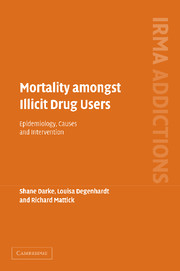Book contents
- Frontmatter
- Contents
- Acknowledgements
- List of tables
- Chapter 1 Why illicit drug-related deaths matter
- Chapter 2 The global epidemiology of illicit drug use
- Chapter 3 Mortality amongst illicit drug users
- Chapter 4 Mortality and drug overdose
- Chapter 5 Illicit drug use and disease
- Chapter 6 Mortality and suicide
- Chapter 7 Mortality and trauma
- Chapter 8 Reducing drug-related mortality
- Chapter 9 Summary and conclusions
- References
- Index
Chapter 1 - Why illicit drug-related deaths matter
Published online by Cambridge University Press: 30 September 2009
- Frontmatter
- Contents
- Acknowledgements
- List of tables
- Chapter 1 Why illicit drug-related deaths matter
- Chapter 2 The global epidemiology of illicit drug use
- Chapter 3 Mortality amongst illicit drug users
- Chapter 4 Mortality and drug overdose
- Chapter 5 Illicit drug use and disease
- Chapter 6 Mortality and suicide
- Chapter 7 Mortality and trauma
- Chapter 8 Reducing drug-related mortality
- Chapter 9 Summary and conclusions
- References
- Index
Summary
Introduction
Over the course of the past 40 years, the use of illicit drugs has increased dramatically in developed nations. Over this period there have been substantial increases in the use of cannabis, opioids, cocaine, amphetamine, and, more recently, amphetamine-like substances such as MDMA (“ecstasy”) (cf. Chapter 2). While the initial increase in illicit drug use occurred within developed nations, recent years have seen large increases in illicit drug use in the developing world. In particular, since the 1990s there have been substantial increases in rates of drug use and drug-related problems in countries such as China, India, and the Republics of the former Soviet Union (Degenhardt et al., 2004a; United Nations Office for Drug Control, 2005).
Clearly, the use of illicit drugs has become an issue worldwide, although the nature of the problem may well vary from nation to nation. In some nations cocaine may be the primary focus, whilst in others opiates may dominate clinical concern. A natural corollary of any increase in the use of illicit substances of any sort, however, is an increase in rates of illicit drug-related death. The use of illicit drugs carries risks for morbidity and mortality, either directly related to the drug itself (e.g. overdose) or as a consequence of such use (e.g. intoxicated driving).
- Type
- Chapter
- Information
- Mortality amongst Illicit Drug UsersEpidemiology, Causes and Intervention, pp. 1 - 9Publisher: Cambridge University PressPrint publication year: 2006



